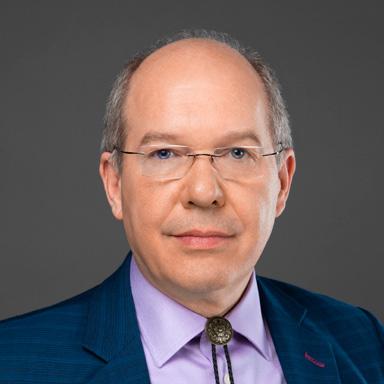
8 minute read
Managing Partner Christopher Anderson Talks About Reinventing Family Law by Eliminating the Billable Hour
In this exclusive interview, Christopher Anderson discusses how New Leaf Family—the firm he co-founded with his wife, Penn Dodson—is reinventing the practice of family law by eliminating the billable hour and introducing innovative pricing models.

You and your wife cofounded New Leaf Family in the wake of the pandemic. What was the turning point that made you both realize it was time to build something different in family law?
Christopher Anderson: The turning point was a long time coming. It's amazing what we can accomplish when given some space, and the pandemic provided that room for my wife, who is also my law partner, and me. We have both experienced family law in our own lives—she in a very difficult way and I in a much more collaborative one. This has given us perspective from both sides.
You’ve described the traditional family law system as broken. What were some of the most frustrating aspects you witnessed personally or professionally that shaped your vision for New Leaf?
Christopher Anderson: Our overriding mission is to change the entire model of family law. Over 50% of married people will encounter it in one way or another during their lives, and it often involves a large amount of interpersonal conflict, which we view as an opportunity for growth.
Family law is a broken system. First, clients frequently expressed frustration with the process. Second, practitioners appeared miserable, experiencing burnout and struggling to find any joy in what should be meaningful work of helping people achieve their future. success looks like for them two years from now, and we dive deep into that vision. the system is set up to bill clients by the hour, it quickly becomes evident that more hours worked translate to more income for the lawyer. While this can be justified as an effort to be thorough or diligent, the unfortunate reality is that more drama and conflict result in more billable hours.
We said to ourselves, "This could either be a gripe session, or we can take action. Do we want to do something about it?" The answer was a resounding yes.
Your firm rejects the billable hour in favor of more predictable pricing. What made you decide to take that leap?
Christopher Anderson: We believe that a significant part of the root cause of why family laws are often violated is the practice of charging clients by the hour. This approach is entirely contrary to helping them achieve their future goals.
I want to clarify that I don’t believe lawyers, including family lawyers, are inherently bad people. They are human, and like all humans, we have certain tendencies. When the system is set up to bill clients by the hour, it quickly becomes evident that more hours worked translate to more income for the lawyer.
While this can be justified as an effort to be thorough or diligent, the unfortunate reality is that more drama and conflict result in more billable hours. This model has been entrenched since the 1970s, when insurance companies first introduced the concept of billable hours.
To address this issue, we decided to eliminate the model entirely. As far as I know, we are the only family law firm doing this. There are other firms promoting flat fee billing; however, even with flat fees, the incentive remains the same: more conflict equals more work and, consequently, more money.
Cases are approached with this adversarial mindset. This is a misunderstanding, especially in family law. You've heard the expression: "If all you've got is a hammer, everything looks like a nail." Similarly, if what we possess are courtroom skills, we tend to view every situation as a potential trial, even though most cases never actually go to trial.
In our practice, everyone has already experienced a loss; there’s only one win to achieve, which is the successful resolution of the case. Our goal should be to shift away from the idea of winning and replace it with the concept of achieving. What do we aim to achieve? We focus on creating a better future for our clients; a future they choose.
So, our first step was to remove the billable hour from our practice completely.
This process can be challenging, as clients often come to us feeling overwhelmed. They tend to focus on the past, who hurt whom, or the present frustrations, such as wanting more time with their kids or needing to sell the marital home.
How has this changed the client experience?
Christopher Anderson: We have completely redesigned the way clients pay for legal services by implementing a subscription model, which provides clients with a level of certainty regarding their legal fees that is rare in other practices. Clients know exactly what they will pay each month until their case is resolved, with no surprises, no retainer, and no future replenishment of uncertain amounts.
Instead of strategizing up front, we focus on a different conversation. We ask the client to envision what
However, nobody typically asks them about their future. By concentrating on that, we establish a clear north star for both the client and ourselves. Many people see this process as a means to help us understand the client's goals, but the primary purpose is to help the clients themselves clarify their goals. We find they often haven't had the opportunity to reflect on their future.
In the course of our work together, if a client requests something that diverges from their goals, we pause and remind them that it’s perfectly acceptable for their goals to change. However, we need to discuss how those changes affect our strategy. Clients are not locked into what they initially communicated on the first day of representation; they can evolve just as their needs, wants, and desires can evolve.
As a result, clients experience less drama and conflict and can anticipate more predictable costs. This model sets us apart.
You've said that rethinking the billable hour benefits not just clients, but law firm culture as a whole. What changes have you observed within your own firm since implementing this model?
Christopher Anderson: Our lawyers appreciate having the pressure of billing off their shoulders. With us, they handle fewer cases and can move them along faster, which actually results in more work being completed in a shorter amount of time.
Admittedly, this business model is less profitable than the traditional hourly billing system, and we accept that as a fact. In exchange for being less profitable, we are able to help significantly more people. Since launching in January 2021, we have assisted over 1,800 families, and we currently have nearly 500 families under our guidance. The market has responded positively to our approach.
Our recruiting efforts for new lawyers emphasize our model. By the time people come in for interviews, they generally understand and align with our system. Although we have had a few misfires, most of the team members who stay with us for more than six months end up staying with us indefinitely. We have a tight-knit team with a low turnover rate.
Regarding the market, we learned that in Colorado, more than half of the family law cases that hire a lawyer end up with the lawyer withdrawing before the case is completed. In contrast, our withdrawal rate is much less than others’, and this includes cases withdrawn due to non-payment or similar issues.
I wish this number were zero. When clients get into our metaphorical car, we want to take them all the way to their destination, which is very important to us. We strive to ensure that all of our clients exit the process having achieved their goals.
As host of your podcast, “The Unbillable Hour,” you talk to legal professionals about better ways to run a law firm. How do you see alternative pricing and management models evolving across other practice areas beyond family law?
Christopher Anderson: I’ve always made it a point not to cover the practice of law itself. Our discussions don't dive into the best ways to handle family law or criminal law. Instead, we focus on the business of law. We talk about marketing and sales, hiring and firing, buying real estate, technology tools, mindset, and how to approach running a firm and life in general.
We have a rotating set of topics all centered around the owner and the business. I consider myself a bit of a teacher. Engaging in this work really fulfills that desire and keeps me learning.
I also serve in an advisory capacity for several law firms across the country, which is a major draw for me; it’s something I genuinely enjoy. My partner and other colleagues sometimes question whether that energy might be better spent elsewhere, as it is quite a commitment.
However, I find that this involvement allows me to gather ideas and insights from various perspectives. If I were confined to the silo of our own firm, it would be much more challenging to stay motivated and learn continuously. Engaging with other firms helps me bring fresh insights back into my own practice, which adds significant value to my role as a leader in the business.









